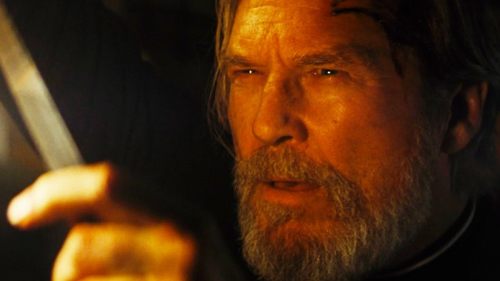HELL OR HIGH WATER Gives This Summer One Of Its Few Highlights
While much more modest and easy going, Hell or High Water offers a crime drama in the mold of films like The Counselor or No Country for Old Men. There is a central criminal story, but the surrounding details and overall setting subtly serve a larger point audiences can either latch onto if they want the film’s full dramatic weight or ignore if they prefer to just watch an entertaining, pulpy yarn.
That pulpy yarn is pretty straightforward. Chris Pine and Ben Foster play brothers (the former a struggling divorced dad, the latter a hothead ex-con) who have days to rob specific amounts of money from specific banks in a complicated scheme to purchase ownership of their family’s land - which they know is about to strike it rich with oil - before the very bank they’re robbing forecloses on it. Jeff Bridges is the nearly retired cop who wants to stop them.
But there’s so much more going on than that. Above all, this is a Texas movie (though apparently it was filmed in New Mexico), not just taking place in the state for arbitrary modern Western purposes, but making its setting an intricate part of the plot.
A curious form of modern lawlessness permeates the film. No one really cares to help Jeff Bridges stop these brothers from robbing an institution that has legally stolen from everyday folks for generations. On the other hand, the brothers frequently contend with open carry cowboys just itching for a sanctioned reason to open fire. The combination of shared economic disparity and Texas independence creates an ever-shifting triangle of allegiance and acrimony between the brothers, the law, and everyday people. I don’t recall ever seeing such a conflict portrayed quite like this.
The film’s three central performances are great across the board, which isn’t surprising considering the cast. With his tired shamble, deadpan observations and mush-mouthed delivery, Jeff Bridges doesn’t really color far outside the lines of his Rooster Cogburn here, though the strength of the script combined with Bridges’ usual charisma negates the familiarity. The same can be said for Ben Foster’s wild, trigger-happy Tanner, the type of role he almost never fails to play yet still feels viable here.
The real star of the show here, however, is Chris Pine, playing a character we instantly recognize as the innocent do-gooder pushed into a criminal plot by forces against his control, an archetype that may actually mask his cold responsibility for every bad thing that happens in the film. Pine must play both protagonist and antagonist simultaneously without ever informing the audience which he is, a remarkably difficult task.
Even when all the cards are on the table, the film refuses to tell us how to feel. Should these brothers be celebrated for using an immoral system against itself? Is it wrong to break corrupt laws? One gets the idea that the very Texans who end up gleefully shooting at the brothers throughout the film might also be inclined to shake their hands had they met at a diner instead of a bank robbery. Lethal violence eventually disrupts this ambiguity to an extent, but it never goes away completely.
Hell or High Water isn’t necessarily a thrilling crime drama. It’s not about shootouts and car chases, though it does feature great examples of those. Instead the film is small and quiet and confident. It has a lot on its mind and conveys these ideas without ever feeling slow or heavy with meaning. You learn to root both for and against its opposing main characters even as the film comes to its inevitable violent conclusion, and unlike most movies that came out this summer, you’ll be itching to discuss it over a few Lone Stars after it concludes.



